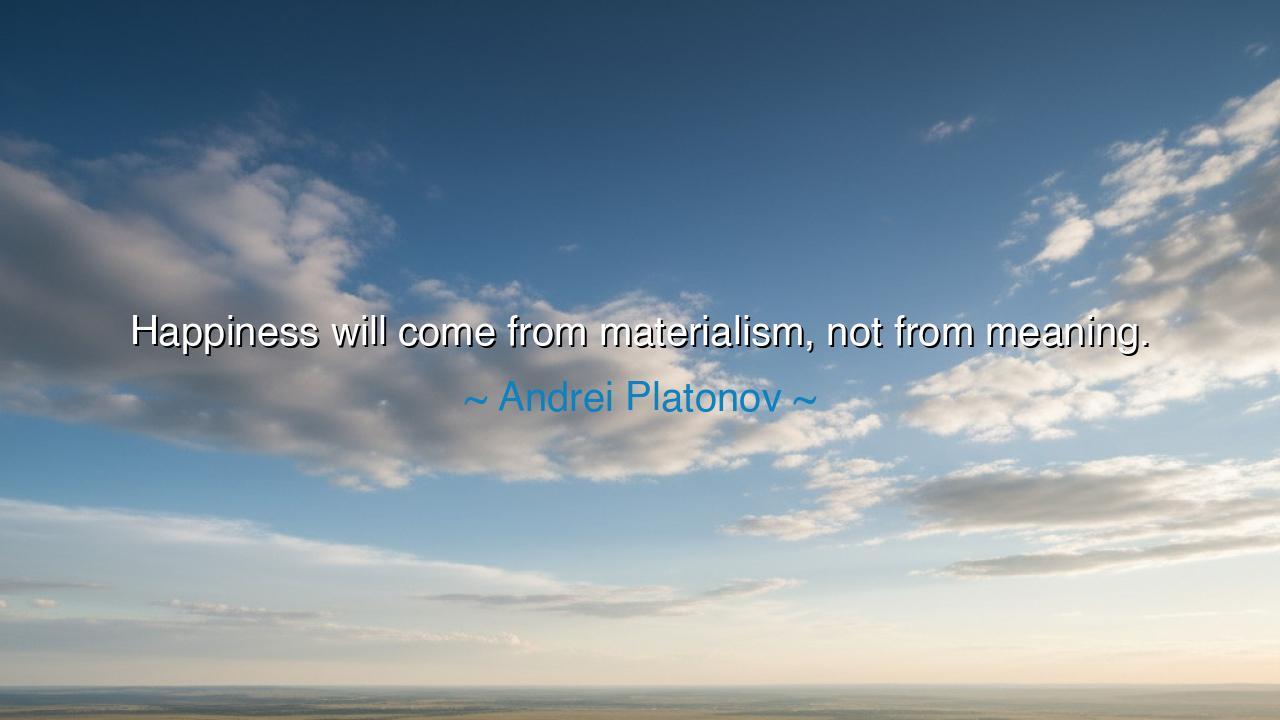
Happiness will come from materialism, not from meaning.






“Happiness will come from materialism, not from meaning.” Thus wrote Andrei Platonov, the Russian novelist and philosopher of the early twentieth century—a man who lived through the tumult of revolution, poverty, and disillusionment. His words, stark and unsettling, are not a celebration of greed or wealth, but a mirror reflecting the hunger of his time. To understand this phrase is to journey into the wounded heart of humanity, to see how hope and despair can dwell in the same sentence. For Platonov, materialism was not the love of possessions, but the longing for a world where human suffering was eased by tangible well-being—where the promise of bread, warmth, and shelter was not a dream but a right.
Platonov’s Russia was a land of grand ideals and terrible deprivation. The people had overthrown tsars and empires, proclaiming a new dawn of equality, yet their hands still trembled from hunger and labor. In such a world, lofty talk of meaning seemed hollow against the cold reality of empty stomachs and broken homes. When Platonov wrote that “happiness will come from materialism,” he spoke as one who had seen philosophy falter before the primal needs of the body. Meaning, he suggested, cannot comfort a starving child; faith cannot replace food. Before man can ponder truth or beauty, he must first survive. Thus, in his grim wisdom, Platonov sought to remind dreamers and idealists that before the spirit may rise, the flesh must be fed.
Yet beneath his words lies not cynicism, but sorrow. For Platonov, materialism was not the end of the soul—it was its foundation. He saw that the laborer, denied both bread and dignity, could not find meaning in mere words or promises. Happiness, therefore, would come not from abstract philosophy, but from the building of a just world, where material needs were met and every person could live without fear. He did not despise meaning; he simply knew that meaning without sustenance is a cruel mockery. In this sense, his materialism was humanistic—it called for compassion, for the recognition that before man can be noble, he must be nourished.
Consider the story of Mother Teresa, who, though a woman of deep faith and spiritual conviction, began her work not by preaching salvation, but by feeding the hungry, clothing the naked, and tending to the sick. She understood, as Platonov did, that the body is the vessel of the soul, and that the first act of love is to care for the physical needs of the suffering. For the starving, happiness begins with food; for the homeless, it begins with shelter. The spirit cannot soar when the flesh is broken. Thus, the path to meaning must first pass through matter.
Platonov’s insight also speaks to the failures of ideology—the danger of seeking happiness only in meaning detached from reality. He saw how grand ideas—communism, nationalism, religion—could promise paradise, yet bring only misery when they ignored the simple, earthly needs of human beings. He understood that true happiness is grounded, not in abstract ideals, but in the small, concrete acts of care that restore dignity to daily life. “Materialism,” for him, meant the practical compassion of giving bread to the hungry, tools to the worker, rest to the weary. Happiness would not descend from the heavens of ideology, but rise from the soil of human labor and justice.
Yet, there is also warning in his words. For if man seeks only material comfort and forgets the higher calling of the spirit, he becomes hollow, enslaved by desire. Materialism without meaning is as empty as meaning without bread. The ancients taught balance—the harmony between body and soul, between the tangible and the transcendent. The wise man tends to both: he builds the home, but he also fills it with love; he earns his bread, but he also shares it. Thus, Platonov’s phrase, though born in despair, calls for a unity of substance and spirit, where happiness is rooted in the earth but reaches toward the stars.
Let this be the lesson, O listener of ages: do not scorn the material, nor worship it. Feed the hungry within and without; build the foundation upon which the temple of meaning may rise. Give thanks for bread, but do not forget to bless it. Work not only for comfort, but for compassion. For as Andrei Platonov teaches us, happiness begins with the tangible—warmth, shelter, the care of one for another—but it blooms fully only when the heart remembers its purpose. When the world joins matter with mercy, and meaning with mercy’s touch, then, and only then, will humanity truly be happy.






AAdministratorAdministrator
Welcome, honored guests. Please leave a comment, we will respond soon